Black Americans stay informed through a variety of sources, with national and local news outlets, interpersonal connections, and social media all playing large roles. While social media is one of the most common sources of information for Black Americans, they generally view it as less credible or reliable than other types of sources.
Sources of news and information
Overall, about a third of Black Americans (32%) say they follow local news extremely or very closely, slightly higher than the 27% who say the same of national news. An additional 35% (local) and 38% (national) say they follow each type of news somewhat closely.
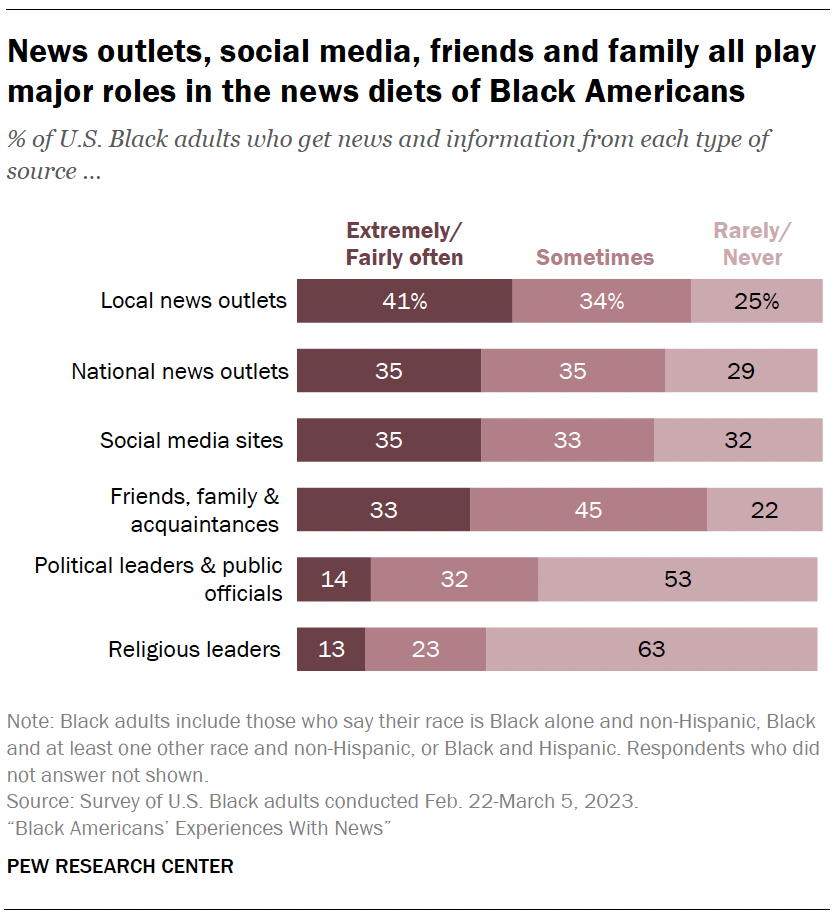
Black Americans rely on a variety of source types to stay informed, and there is no single dominant source for the group. About four-in-ten Black Americans (41%) say they get news from local news outlets extremely or fairly often, followed closely by national news outlets (35%), social media sites (35%) and family, friends and acquaintances (33%).
Large majorities say they get news and information from each of these sources at least sometimes. Black Americans are much less likely to say they get news and information directly from political leaders and public officials or from religious leaders.
These findings are largely in line with previous Center research showing the wide mix of sources that the American public broadly relies on for news – including news directly from news outlets, social media sites and search engines, among others. Black adults tend to get news from news websites and apps at about the same rate as the population overall, and more commonly turn to social media.
Quotes from focus groups on where they go for news and information:
“I get a lot of information from [source name]. … They’ll tell you all about the candidates, they’ll tell you new restaurants, they’ll tell you if there’s crime in the area.” –Black woman, 65
“I just like things at my fingertips. If I’m not watching TV, I have my phone. So it’s easy for me to just look on the app or social media.” –Black woman, 38
“Between Google, social media and my mother I can find out anything I need to know. If my mom’s not already telling me about it, I know Google will give it to me or I can search it up on Instagram and find whatever I’m looking for.” –Black woman, 23
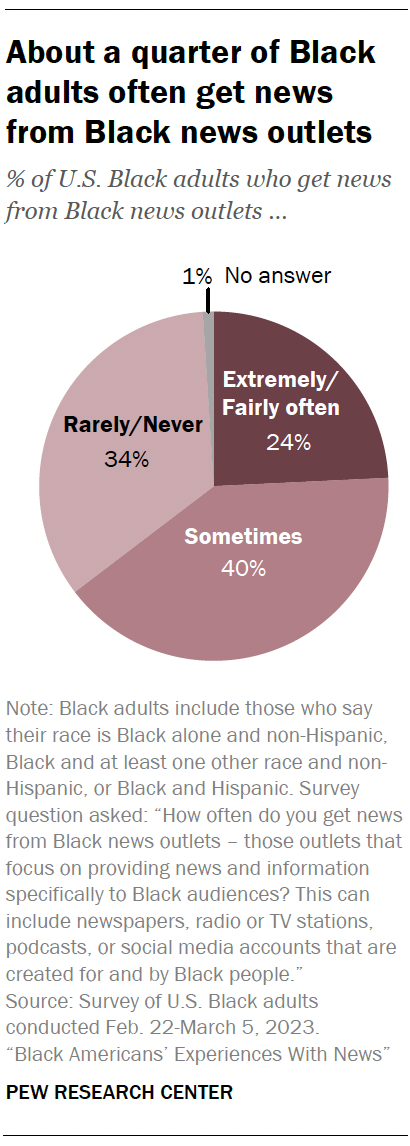
This survey also asked about the role of Black news outlets – those created by Black people that focus on providing news and information specifically to Black audiences – in how Black Americans stay informed.
About a quarter of Black Americans (24%) say they get news from Black news outlets extremely or fairly often, and another 40% say they do so sometimes.
Quotes from focus groups on getting news from Black news outlets:
“There’s several newsletters/newspapers in my area … of course, it gives the perspective of what’s going on in the African American community, in my community.” –Black woman, 60
“One of the podcasts I listen to happens to be a podcast with a group of Black lawyers. … More of the information that I’ve got from that has not been on the news, and the things that I’ve seen [have] actually come from people in those communities or those who are not afraid to go to those communities and those who culturally understand those communities.”
–Black woman, 33
The role of social media in news and information diets
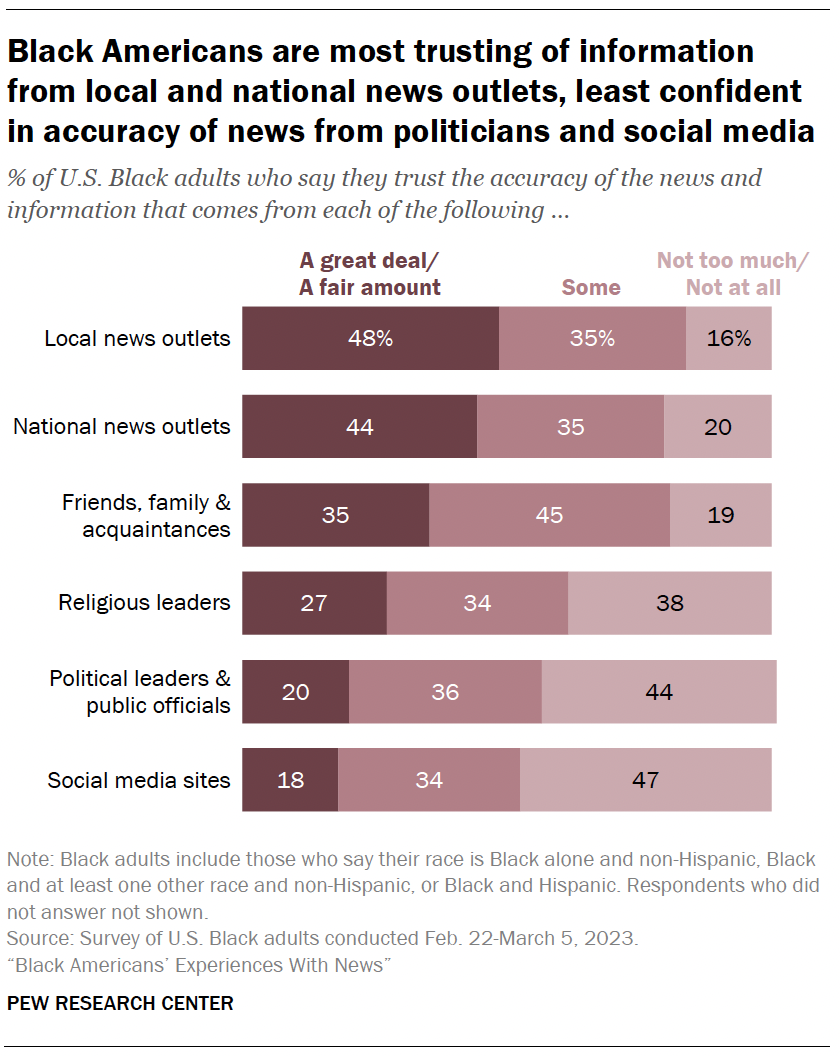
Many Black Americans report getting news on social media. But as is the case with Americans more broadly, Black Americans are less likely to trust the news they get there than information that comes directly from local or national news outlets or friends and family.
Black Americans express the highest levels of trust in news and information from local and national outlets. Almost half of Black adults say they have a great deal or fair amount of trust in the accuracy of news and information from local news outlets (48%), closely followed by national news outlets (44%). And about a third trust the accuracy of information from friends, family and acquaintances (35%).
Only about one-in-five Black Americans say they have a great deal or fair amount of trust in information that comes from politicians (20%) or social media sites (18%). In both cases, more than four-in-ten say they have little to no trust in the accuracy of these sources.
Not only do Black Americans express relatively little trust in news from social media, but they are more likely to prefer getting several types of information from news outlets than from social media posts. Sizable shares, though, do not express a preference for one over the other.
Black Americans who get news on social media at least sometimes were asked whether they prefer news outlets or social media posts for five categories of information – such as the basic facts about an issue or event, in-depth information about an issue or event, and opinions on an issue.
For each of the five types of information, Black Americans are more likely to prefer news outlets than social media. Among those who get news on social media, 44% say they prefer news outlets for getting the most in-depth information about an issue or event, with just 9% saying they prefer social media posts for this information (an additional 40% say they value both equally, while 7% say they prefer neither option).
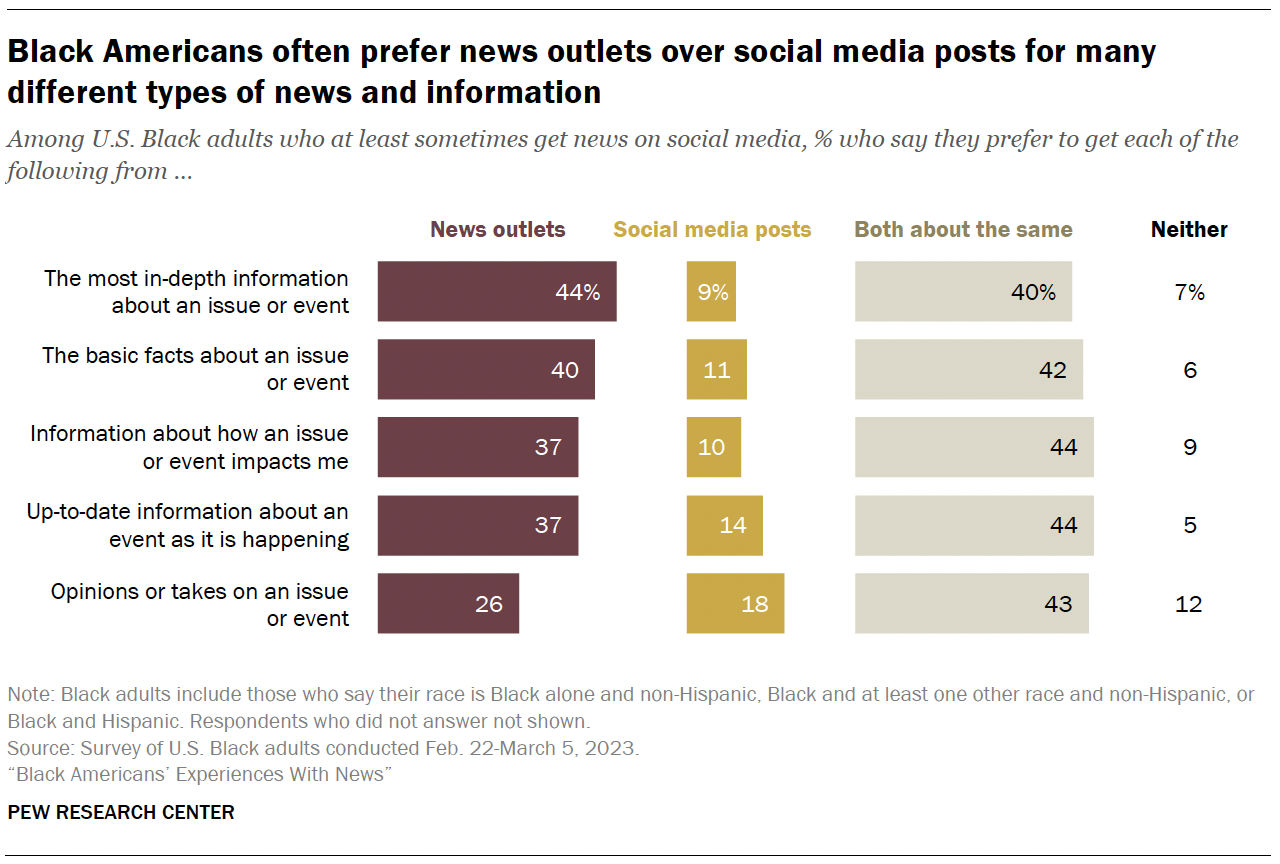
There are similar gaps when it comes to getting the basic facts about an issue or event (40% favor news outlets vs. 11% social media) and getting information about how an issue or event impacts them (37% vs. 10%). Even for up-to-date information about an event as it is happening, news outlets are more often preferred (37% vs. 14%).
Black Americans are more ambivalent about where they get opinions on an issue. News outlets are still the preferred option, but by a much smaller margin (26% vs. 18%).
Where are people getting news on social media?
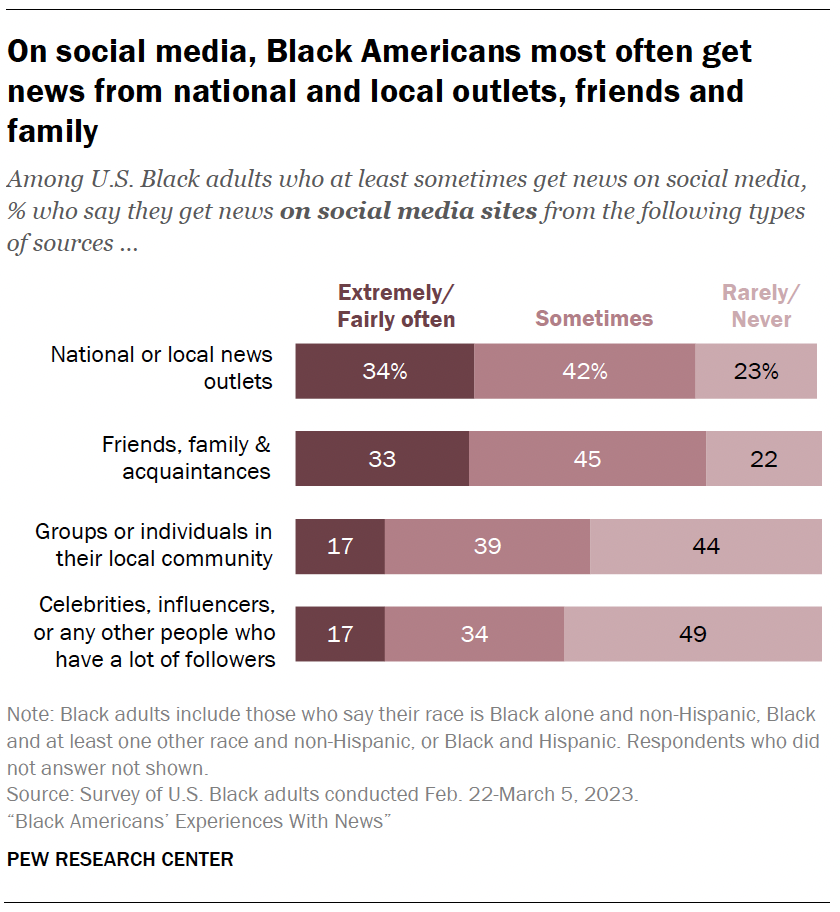
Social media by definition contain information from a wide variety of sources. But within these platforms, Black Americans are most likely to get news from national and local news outlets and friends and family – suggesting a lot of overlap between social media and these broad categories.
Among Black Americans who get news on social media at least sometimes, about a third say that on social media sites they extremely or fairly often get information from national or local news outlets (34%) or family, friends and acquaintances (33%). About three-quarters say they get news from each on social media at least sometimes.
Two other types of sources on social media are used less frequently for news: 17% of Black social media news consumers say they get news on social media at least fairly often from groups or individuals in their local community or from celebrities, influencers or other people who have a lot of followers.
Similarities and differences in news sources within the Black population
A range of similarities and differences emerge within the Black population across demographic groups in the types of sources they go to and trust for news and information.
For instance, some of the largest differences are between age groups, largely in line with differences by age among all U.S. adults. Black adults 50 and older are far more likely to say they extremely or fairly often get news and information from national and local news outlets, whereas Black adults under 50 are far more likely to say the same of social media sites.
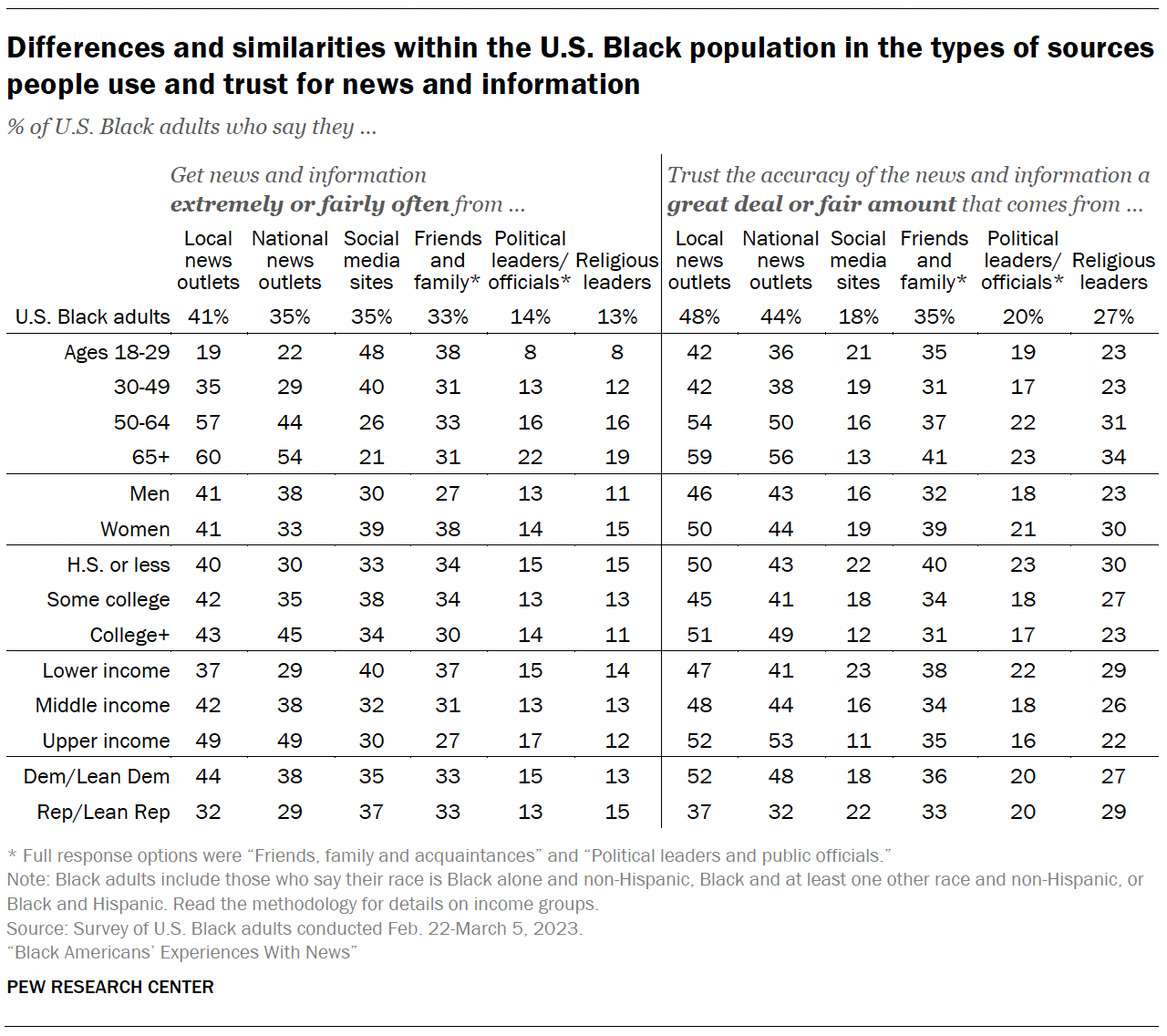
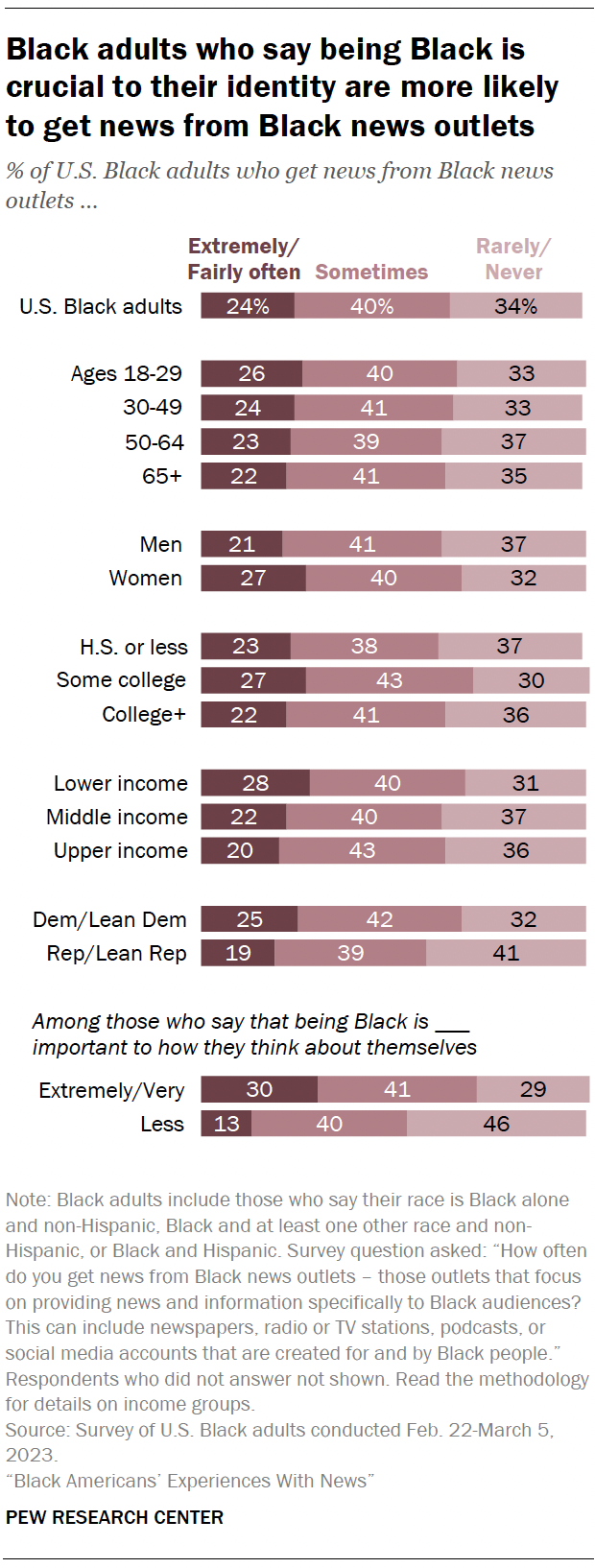
Black Republicans are less likely than Black Democrats to have high levels of trust in the accuracy of the news and information that they get from national and local news outlets, consistent with differences between the parties overall.
There are only modest differences – if any at all – among Black Americans in the share who get news from Black news outlets across age, gender, education, income and political groups.
For example, there is a slight difference between those at different income levels – 28% of lower-income Black Americans say they get news from Black outlets extremely or fairly often, compared with 20% in the highest income group. And Democrats are modestly more likely than Republicans to say they get news from these sources (25% vs. 19%).
A more substantial difference emerges between those who feel that that being Black is a critical part of their identity and those who feel it is less important. Among those who say that being Black is extremely or very important to how they think about themselves, 30% report they get news from Black news outlets extremely or fairly often – more than double the share among those who say being Black is less central to their identity (13%).


